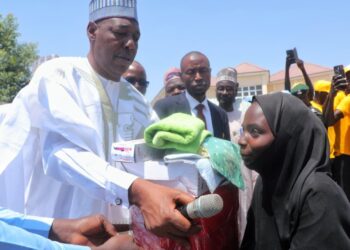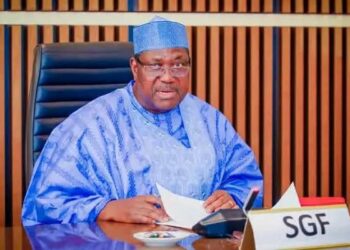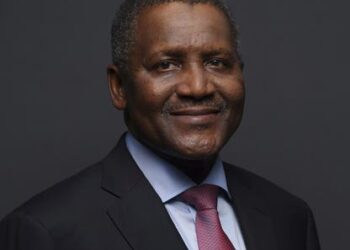The Independent Media and Policy Initiative (IMPI) says there are enough evidence to show that the economic policies of the President Bola Tinubu administration will set new records in 2025.
Chairman of IMPI, Dr Niyi Akinsiju, stated this in a policy statement released on Sunday.
The IMPI explained that it came to that conclusion after a fundamental analysis of the emerging pattern of the economy since the introduction of the Tinubu reforms 19 months ago.
According to the policy think tank, the optimistic outlook transcends the oil and non-oil sectors in spite of initial hitches.
It said : “Historically, the oil sector has faced persistent challenges, including declining production caused by crude oil theft, pipeline vandalism, and reduced investments.
“However, 2024 efforts yielded notable improvements in output.
“For instance, the local refining of petroleum and the complete deregulation of the downstream sector of the oil industry have led to price competition on Premium Motor Spirit (PMS) or petrol and made smuggling of petroleum products across the country’s borders unattractive.
“The approval of five oil asset sales and two Final Investment Decisions (FIDs) in 2024 also elicited positive feelings from foreign investors willing to do business in Nigeria’s energy sector.
“In 2025, oil sector analysts project that production will likely average 1.7 million barrels per day (bpd) and close the year at 1.78 million bpd.
“This excludes condensates that do not fall within the purview of OPEC’s basket of crude.
“This optimistic outlook is underpinned by measures to address oil theft, including the implementation of the Advance Cargo Declaration regime by the Nigerian Upstream Petroleum Regulatory Commission (NUPRC).
” This initiative ensures that all exported crude oil and gas cargoes are uniquely identified, verifying the legitimacy of export documentation and reducing the theft of resources.
“Additionally, the NNPC plans to replace ageing crude oil pipelines, some of which have been in use for over four decades to support output and operational efficiency further.
“To enhance crude oil production, President Tinubu signed three executive orders (EOs) in February 2024 aimed at improving the investment climate and positioning Nigeria as the preferred investment destination for the petroleum sector in Africa.
“One of the EOs legally mandates that the contracting cycle be compressed to a maximum of six months in alignment with global industry standards.
“This significantly reduces delays that historically took up to two years or more, thus improving Nigeria’s competitiveness.
“The executive order also mandates the Nigerian National Petroleum Company Limited (NNPCL) and the Nigerian Content Development and Monitoring Board (NCDMB) to implement a single-level approval process for requalification, technical, commercial, and final stages and ensures that approval is issued within 15 days.
“This is expected to eliminate redundant multi-stage approvals and ensure that regulatory approvals are obtained more efficiently, fostering timely project execution, and reducing compliance costs.
“The plan to hold a fresh oil licensing round in 2025 is focused primarily on handing out oil blocks that remained undeveloped.
“This is another fillip in the effort to hike crude oil production and raise crude reserves and production.
“Aggregating policies and implementation templates and other federal government’s efforts in the sector, the federal government will accomplish its target to increase crude oil production to 2.06 barrels per day as proposed in the federal budget 2025.”
The group admitted that the naira lost a chunk of its value especially in 2024 when it depreciated by 40.9 % before appreciating in December but also pointed at the domino effect in ensuring a trade surplus for the country reflecting a strong contribution of the non oil sector for the first time in recent years.
“CBN data for October 2024 highlighted a positive trade performance driven by more substantial export earnings than imports.
“This reflects a third consecutive quarter of trade surplus in 2024.
“The trade surplus expanded to US$2.21 billion, up from US$2.07 billion in September.
“This improvement was fueled by a 3.51 per cent rise in total exports, which increased to US$5.02 billion from US$4.85 billion the previous month.
“Export growth was attributed to higher values in crude oil and non-oil products.
“Though crude oil and gas exports continued to dominate Nigeria’s export landscape, accounting for 87.74 per cent of total exports, the non-oil exports recorded impressive growth, increasing by 19.23 per cent to US$0.62 billion from US$0.52 billion in September.
“Higher export receipts for key agricultural commodities such as cocoa, beans, urea, sesame seeds, cocoa products, aluminium, and copper primarily drove this growth.
“Brazil emerged as the top destination for Nigeria’s non-oil exports, followed by the Netherlands, Malaysia, Japan, and Germany.
“To highlight Nigeria’s growing export competitiveness in the global market, the Nigeria Customs Service (NCS) declared that it recorded an impressive total Cost, Insurance, and Freight (CIF) value, rising to N136.65 trillion in exports in 2024 from N42.77 trillion in 2023.
“This translates to an extraordinary 219.5 per cent increase.
“The volume of exports surged significantly from 3.70 billion kilograms in 2023 to 12.35 billion kilograms in 2024.
“The trade surplus, as recorded, reflects the impact of the depreciated naira on international trade.
“The depreciation of the naira in the official market boosted export values, energising export activities while making imports more expensive. This has contributed to an improved trade balance,” IMPi added.
This according to the policy group also helped enhance inflows into the federation account and paved way for increased disbursements to all the tiers of government especially in Q3 2024.
It said: “The third quarter of 2024 recorded more money flowing into Nigeria’s federation account, which grew to N6.86 trillion.
“A CBN economic report showed a 7.48 per cent increase from the previous quarter.
“The extra money came mainly from increased Company Income Tax (CIT) and Value-Added Tax (VAT).
“We note with interest that most of the money came from non-oil sources, which brought in N5.56 trillion, while oil revenue made up the rest.
“The increase in revenue was due largely to higher receipts from corporate tax and VAT, which accounted for 81 per cent of the inflow into the federation account.
“This implies a relatively healthy business and operational environment for corporate Nigeria.
“Oil revenue dropped by 24.72 per cent to N1.30 trillion compared to the previous quarter.
“From the total N6.87 trillion collected, the government shared N3.92 trillion among the three tiers of government, indicative of continued revenue growth and more revenue available to be shared since the withdrawal of fuel subsidies and liberalisation of the foreign exchange market.
“A significant 63.7 per cent increase was recorded in International Money Transfer Operators (IMTO) inflows for the first nine months of 2024.
“Inflows rose from $2.33 billion during the same period in 2023 to $3.82 billion in 2024.
“This growth has been variously attributed to a series of targeted reforms introduced under Mr Olayemi Cardoso, Governor of the Central Bank of Nigeria, who assumed office in September 2023.”
IMPI added that the ongoing rebasing of Nigeria’s Gross Domestic Product (GDP) will further show the resilience of the economy as well as a more diversified and dynamic economic landscape under President Tinubu.(vitalnewsngr.com)




















